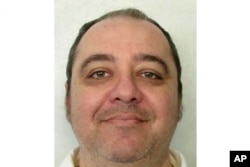The U.S. state of Alabama is set to execute an inmate Thursday night with nitrogen gas, a never-before-used method that human rights groups have called cruel, but the state says is humane.
Kenneth Eugene Smith, 58, is scheduled to be executed over his conviction in the 1988 murder-for-hire killing of Elizabeth Sennett.
Alabama is planning to put a respirator mask over Smith’s face and replace his breathing air with pure nitrogen gas, leading him to die from a lack of oxygen.
This will be Alabama’s second attempt to execute Smith. His 2022 lethal injection was abruptly called off when authorities couldn’t connect the IV line.
Smith’s lawyers on Thursday asked the U.S. Supreme Court to stop the execution in order to evaluate claims that the new method violates the constitutional ban on cruel and unusual punishment.
The human rights group Amnesty International condemned the scheduled execution and called on Alabama Governor Kay Ivey to use her clemency power to halt it.
“While Amnesty International is opposed to the death penalty in all cases, there are specifics about Kenneth Smith’s circumstances that make it even more disturbing that Alabama is willing to carry out this execution,” Amnesty researcher Justin Mazzola said in a statement.
Amnesty also noted that Smith is only on death row because a judge overruled a jury vote for life imprisonment without the possibility of parole. That practice, known as judicial override, was outlawed in 2017 in Alabama but was never made retroactive, according to Amnesty.
The United Nations Human Rights Office has also urged Alabama authorities to halt Smith’s execution.
Ravina Shamdasani, spokesperson for U.N. High Commissioner for Human Rights Volker Türk, said in a statement that execution by nitrogen asphyxiation “could amount to torture or other cruel, inhuman or degrading treatment or punishment under international human rights law.”
“Rather than inventing new ways to implement capital punishment, we urge all States to put in place a moratorium on its use, as a step towards universal abolition,” Shamdasani said in the statement.
Some information in this report came from The Associated Press.

